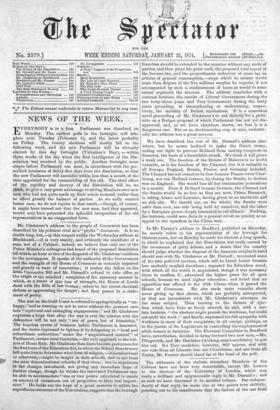In Mr. Forster's address to Bradford, published on Saturday,
he merely -refers to his representation the borough for thirteen years, but on Monday he made his electors a long speech, in which he explained that the Dissolution was really caused by the recurrence of petty defeats, and a desire that the country should judge whether the disposal of the immense surplus in hand should rest with Mr. Gladstone or Mr. Disraeli ; recounted some of his own political services, which will be found better because less modestly recalled elsewhere ; repeated his Education creed, with which all the world is acquainted, though it was necessary there to reaffirm 'it; advocated the higher grant for all open Schools, because we need higher education ; and noted that no opposition was offered to the 25th Clause when it passed the House of Commons. He also made some remarks about never giving up that clause, which are probably misreported, as they are inconsistent with Mr. Gladstone's utterance on the same subject. Then turning to the threats of ejec- tion which have been so freely uttered, he said, with a cer- tain hauteur, " the electors might punish the 'workman, but could not undo the work ;" and finally, expressed his full sympathy with workmen in most of their complaints,Iii all except, perhaps, as to the justice of the Legislature in controlling the employment of adult women in factories. The Electoral Committee in Bradford have, nevertheless, decided to' bring forward two new men, —Mr. Iffingworth, and Mr. Hardaker (working-man's candidate), to put him out. No Tory candidate, however, will appear, and with one vote from all Liberals who are Churchmen, and one from all' Tories, Mr. Forster should stand far at the head of the poll.


































